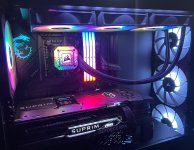XD Lets just agree to disagree on this matter. I hope you have a nice day man.So 1440p on a GPU about on par with an RX5700XT with raytracing. And it still looks pretty good. That's also not the same game.
You are using an out of date browser. It may not display this or other websites correctly.
You should upgrade or use an alternative browser.
You should upgrade or use an alternative browser.
I want to get a gaming PC but I know nothing about them, advice thread
- Thread starter Scooby Doo
- Start date
More options
Who Replied?The FX series on the whole was a massive dumpster fire. They were so bad they almost reduced AMD to the annals of history like Cyrix.Architecture matters more. It has always mattered more. The i7-980 was a 6c/12t CPU on 32 nm with a tdp of 130w, the contemporary FX part on 32nm was the FX 9590 at a 220w tdp. The first was faster.
Ryzen not only redeemed AMD, it saved the company.
Vyor
My influence grows!
The FX series on the whole was a massive dumpster fire. They were so bad they almost reduced AMD to the annals of history like Cyrix.
Ryzen not only redeemed AMD, it saved the company.
It wasn't just FX that hurt them, it was anti-competitive practices from Intel that lead to them being forced to rush the chips out on a broken process node.
That too.It wasn't just FX that hurt them, it was anti-competitive practices from Intel that lead to them being forced to rush the chips out on a broken process node.
There are very, very, very, very, very few games a 4080 can't run at max 1440p60fps.
And you have no idea what you're talking about.
So what? If he's wrong now he won't be a month or two from now.
And just how well do such games run? How hot do they make the computer run, thus shortening its lifespan?
Vyor
My influence grows!
How hot do they make the computer run, thus shortening its lifespan?
That is not how that works. Voltage kills chips, not temprature.
And that also depends on cooling.
Temperature requires higher power to keep performance, which makes higher voltage which kills the chip though.That is not how that works. Voltage kills chips, not temprature.
And that also depends on cooling.
Unless you're doing something terribly wrong, you're not going to blast a chip which is at a cozy 40 degrees.
Vyor
My influence grows!
Temperature requires higher power to keep performance, which makes higher voltage which kills the chip though.
Unless you're doing something terribly wrong, you're not going to blast a chip which is at a cozy 40 degrees.
That is... not how that works. Higher voltage creates higher temperatures, but you can absolutely kill a chip at 40c just by having too much voltage.
Are you trying to be argumentative for argument sake?That is... not how that works. Higher voltage creates higher temperatures, but you can absolutely kill a chip at 40c just by having too much voltage.
Simple electronics, heat equals higher electrical resistance. There's a reason why we don't like running electronics at 100 degrees, it's because
A: It makes them eat up more power, that's bad
B: It means said power you're forcing into them makes them break earlier/easier
You can bust a chip at any temperature with voltage provided you toss cryogenics on it, but in the context of a PC high temps means your computer is having to toss more electricity into the device to keep it working properly, it's why most hardware throttles itself at higher temperatures because electronics will more than happily continue to eat more electricity until it fries itself because heat=voltage=heat
Anyone else remember this thread being about helping a guy build a PC?

He got some pretty good advice though, hopefully he ends up with a good and affordable rig.
Okay, here are a few important points in a nutshell:
1) What do you want to do? I only do offline gaming so Internet connections and costs associated with it do not concern me, but if you plan on heavy online gaming that could require a costly Internet service. Figure $$$$$. Do they have a habit of dumping models after a few years or do they stick by their customers?
2) Games are only going to get (often needlessly) more demanding so a game rig that's "just" good enough today will be underpowered tomorrow. If a much better one costs some more save up for it.
3) Check around for brand reputation. Does the company have good, helpful customer service? If there is a problem do they make you jump through nuclear hoops to get a refund or replacement? Do they want access to your private information?
4) What are your technical skills? If you can work on a rig and upgrade it yourself that will be a huge advantage, if a brand makes that easier consider that and always follow all safety protocols- "Midnight Ghost Hunt" isn't worth becoming an actual ghost for.
5) Go online, ask around about game rigs. Find out if they are reliable or if they are high-tech trash. The best reviews are from fellow gamers.
6) What kind of games do you like, are game rigs such that they can play certain kinds but not others? I use an Intel laptop for gaming but it also had Puppy Linux on it; in the future with the new hard drive it will use Linux Ubuntu but with WINE it can play most Windows games as well (even Puppy Linux 6 with WINE 1.7 it does pretty well). This greatly expands my options, I am not limited to Linux games! x 21
x 21
7) Sit down, write down what you want. Then go back to it later and see what you missed. Plan ahead.
1) What do you want to do? I only do offline gaming so Internet connections and costs associated with it do not concern me, but if you plan on heavy online gaming that could require a costly Internet service. Figure $$$$$. Do they have a habit of dumping models after a few years or do they stick by their customers?
2) Games are only going to get (often needlessly) more demanding so a game rig that's "just" good enough today will be underpowered tomorrow. If a much better one costs some more save up for it.
3) Check around for brand reputation. Does the company have good, helpful customer service? If there is a problem do they make you jump through nuclear hoops to get a refund or replacement? Do they want access to your private information?
4) What are your technical skills? If you can work on a rig and upgrade it yourself that will be a huge advantage, if a brand makes that easier consider that and always follow all safety protocols- "Midnight Ghost Hunt" isn't worth becoming an actual ghost for.
5) Go online, ask around about game rigs. Find out if they are reliable or if they are high-tech trash. The best reviews are from fellow gamers.
6) What kind of games do you like, are game rigs such that they can play certain kinds but not others? I use an Intel laptop for gaming but it also had Puppy Linux on it; in the future with the new hard drive it will use Linux Ubuntu but with WINE it can play most Windows games as well (even Puppy Linux 6 with WINE 1.7 it does pretty well). This greatly expands my options, I am not limited to Linux games!
7) Sit down, write down what you want. Then go back to it later and see what you missed. Plan ahead.
49ersfootball
Well-known member
I want to play
And
And the upcoming Starship Troopers extermination game
I want it to run smoothly but I don't know what sort of good custom PC to buy. My dad told me the ones on BuildRedux are a massive rip off and I can get a "good" one that is on par with the BuildRedux PC's for half the price of their cheapest option.
You're sure about this 🤔
Grey Goo is kinda crap, and Extermination isn't even out yet.You're sure about this 🤔
But Terran Command is a perfectly acceptable if...Really underwhelming RTS.
Vyor
My influence grows!
Any recommendations for a PC that can handle modded minecraft?
Did you see my build guide? That, that can do it. Very easily.
Vyor
My influence grows!
Will look it over but may buy premade. My last one was bought in May 2015.
Don't bother with a premade, they'll sell you substandard parts that'll die as soon as warranty is over.
Premades actually have a better price-performance ratio than homebuilt. A friend of mine asked if I could build him a new PC for his girlfriend to play Diablo with, and I pointed him to CyberPowerPC, because they could sell him something that was like a thousand dollars less than what it would cost for me to put it together for the same performance.
I just finished a new build, by the way.
Overall, it turned out nice:

If anyone wants to get into DIY PC building, they should be doing it for the pleasure of it, and owning something that's built to their exact specifications. The price-performance ratio is pretty much always worse.
I've built computers for my buddies IRL, before. I always asked them, beforehand, what their budget was and what their intended use cases were. It really differs widely from person to person. Some guys want a photography or video encoding rig, other people want one for gaming, maybe this one other guy wants one for photography, and they're all just a little different in terms of what parts you should prioritize. My desktop is always a Gaming/DAW machine, so it needs to do double duty as a workstation, hence the absolutely ridiculous quantities of RAM (to load up sampled instruments with), but a gaming rig today can easily get away with having "only" 32 or 64 gigs of RAM, depending mostly on how many Chrome tabs you'd like to have open in the background. Most games primarily require GPU performance, but not all. Java games, or games with lots of physics simulations (like Kerbal Space Program or Space Engineers) tend to lean on the CPU more. The ideal CPU to run KSP, for example, is one with high single-threaded performance, since all the physics on a single craft run on a single thread (KSP's engine cannot split the physics on a single craft across multiple CPU threads, and the framerate will throttle as the CPU struggles to keep up).
For the kind of games OP wants to play, a compact MicroATX rig with an RTX 3060 and 32 gigs of RAM would be more than enough.
In fact, to play Grey Goo and Starship Troopers (and maybe the occasional AAA game on moderate settings) this is what I'd build:

It doesn't have to cost a fortune. It can be compact and quiet. This case even has a hidden optical drive bay, so you could add a Blu-ray writer and play movies or burn files off.
I just finished a new build, by the way.
- Case: Fractal Design Meshify 2
- PSU: EVGA SuperNOVA 1300 GT
- Mobo: MSI MPG Z790 Carbon
- CPU: Intel Core i9-13900K
- Cooler: Corsair iCUE H150i ELITE CAPELLIX 360mm AIO
- RAM: Corsair Vengeance 192GB (4x48GB) DDR5-5200
- GPU: MSI GeForce RTX 4090 SUPRIM X 24G
- Storage: 2x 2TB Samsung 980 Pro M.2 SSDs, 2x 4TB Samsung 870 EVO SATA SSDs (soon to be 4x SATA SSDs, when the rest show up).
Overall, it turned out nice:

If anyone wants to get into DIY PC building, they should be doing it for the pleasure of it, and owning something that's built to their exact specifications. The price-performance ratio is pretty much always worse.
I've built computers for my buddies IRL, before. I always asked them, beforehand, what their budget was and what their intended use cases were. It really differs widely from person to person. Some guys want a photography or video encoding rig, other people want one for gaming, maybe this one other guy wants one for photography, and they're all just a little different in terms of what parts you should prioritize. My desktop is always a Gaming/DAW machine, so it needs to do double duty as a workstation, hence the absolutely ridiculous quantities of RAM (to load up sampled instruments with), but a gaming rig today can easily get away with having "only" 32 or 64 gigs of RAM, depending mostly on how many Chrome tabs you'd like to have open in the background. Most games primarily require GPU performance, but not all. Java games, or games with lots of physics simulations (like Kerbal Space Program or Space Engineers) tend to lean on the CPU more. The ideal CPU to run KSP, for example, is one with high single-threaded performance, since all the physics on a single craft run on a single thread (KSP's engine cannot split the physics on a single craft across multiple CPU threads, and the framerate will throttle as the CPU struggles to keep up).
For the kind of games OP wants to play, a compact MicroATX rig with an RTX 3060 and 32 gigs of RAM would be more than enough.
In fact, to play Grey Goo and Starship Troopers (and maybe the occasional AAA game on moderate settings) this is what I'd build:

It doesn't have to cost a fortune. It can be compact and quiet. This case even has a hidden optical drive bay, so you could add a Blu-ray writer and play movies or burn files off.
Users who are viewing this thread
Total: 4 (members: 0, guests: 4)
